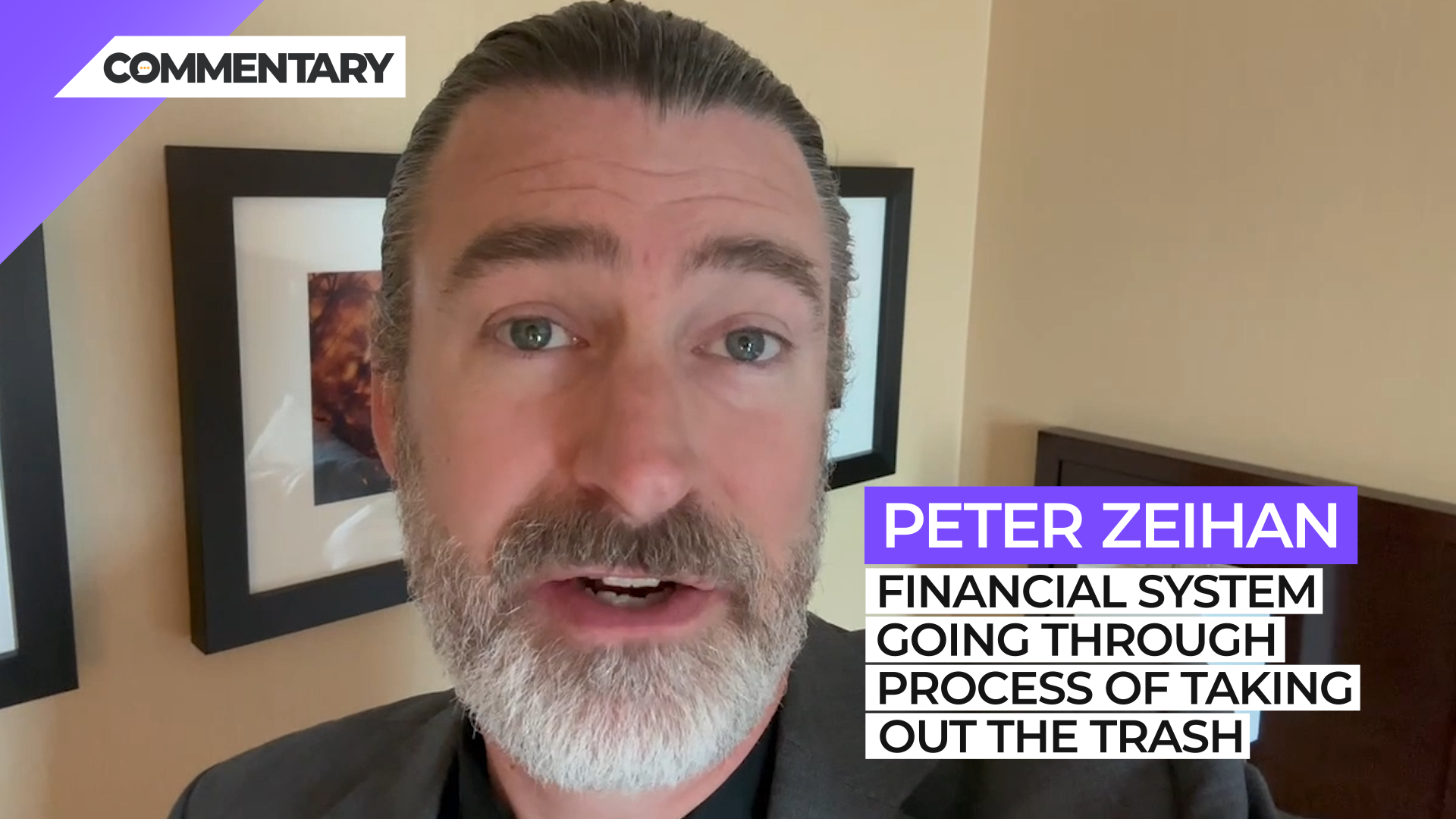
Commentary
-
Our commentary partners will help you reach your own conclusions on complex topics.
Hey everybody, Peter Zeihan here coming to you from … Bloomington, Illinois. Sorry, I forgot where I was there for a second. It is the 14th of March, Tuesday. And for those of you who have been following the news, you of course know that the United States is facing a little bit of a banking hiccup right now. Over the course of the last few days, three banks of note, Silvergate, Signature, and Silicon Valley have either been closed by regulators or just simply collapsed. And this is something that honestly, I don’t think anyone should really overly worry about.
The biggest of them, Silicon Valley, is like number 16 in the country, so this is nothing like the financial crisis of 2007 when all of our big 10 banks were in trouble all at the same time. Now, normally, when you have a financial crisis, it’s because of a problem with loans. Whenever the business cycle turns, the cost of capital goes up and loans that may have made sense in the past don’t anymore.
So in 2007, the issue was subprime. We had, based on how you measure the math, somewhere between half a trillion and two and a half trillion dollars of questionable loans in the real estate market. And that meant it touched almost every single bank within the entire system. So when the real estate market turned, and we realized that a lot of these people were baristas who had no incomes and had qualified for 100% mortgages on million-dollar homes and those loans went bad, we had problems across the entire space. Nothing like that is going on this time.
We’ve had some very strong expansion and certainly, capital’s probably been overly cheap, and there is some rot in the system that does need to be worked out. And what basically what’s going on is, the financial system is going through the process of taking out the crap trash right now.
You would expect some banks to go down; that’s not necessarily a signal of a broader contagion, systemic risk sort of thing. In addition, the United States has something called the FDIC, the Federal Deposit Insurance Corporation, which is a system by where all banks pay a monthly fee into the system in order to get insurance for their depositors. So as long as your deposit is under a quarter of a million dollars, you are federally guaranteed to get your money back without the federal government having to do anything.
That system has kicked in and depositors will be made whole. It makes sense that these three banks are the ones that went under first. They won’t be the last probably, although that doesn’t mean I’m concerned about something like eating through the entire system like a cancer. It’s just that they’re all related to tech and tech tends to be a capital-intensive industry. And especially when you’re talking about newer firms and startup firms and research firms, which are what these banks cater to, you’re talking about institutions and companies that don’t make money today. They’re hoping to make money next year, or the year after, the year after that or invest in the next big thing. So they tend to be more prospective, they don’t have to all have any income.
And so when capital costs go up, they fix problems. And so these banks are the ones that are facing the issues. So there’s nothing about this that is any more than a run-of-the-mill bank failure, but matches most of our understanding is about macroeconomic trends. I don’t want to say it’s nothing to worry about. But I’m really not concerned about an overall national bank contagion or a broad bank run. And I think what the stock markets have done in discounting all things financial is a gross overreaction. So there’s that.
Now, there are three reasons why this time, it is a little bit different. First of all, Tech has been on a tear for the last several years. And not just because capital has been cheap, but because of COVID. When we all found ourselves living and working at home, we needed better cameras, we needed ring lights, we needed computers, we need to update our phones, and so in the year 2020, and 2021, and to a lesser degree in 2022, we were all buying all kinds of tech-related products generating a bit of a boom. Well, once you buy the newest and greatest computer and phone, you probably are going to wait before you get the next one. And so we were always going to have a little bit of a tech bust independent of what was happening with the overall economy. So that’s one.
Number two, this is a little atypical for a bank run or a bank crash because normally the problem is on the loan side. It really isn’t this time, it’s not that there hasn’t been a capital crunch. But in the tech startup space, these companies usually don’t go to like, the Small Business Administration to get a business loan. They get their capital directly from a venture capitalist. And it’s the venture capitalists who are finding themselves with less capital to throw at situations. So they’re not as able as they have been to throw money at these small startups. And so the startups have been drawing down on their cash, which means the problem from the bank’s point of view hasn’t been with the money that they’ve lent out. They don’t lend out very much it’s been with the money that they thought they had. So as deposits have been drawn down, they haven’t had enough operating capital to continue normal operations.
Now, this is mostly good news because it means the overall exposure to the financial sector, which is normally what how happens when you sell loans among banks, just isn’t there. But it’s a very big problem for the tech sector. And then we get to our third problem, which is how the Biden Administration has chosen to deal with it.
Now, if you’re dealing with a deposit that’s under a quarter of a million dollars, the federal government doesn’t have to lift a finger because the FDIC will take care of it. But a lot of these small startups, they put all of their money into individual banks, most notably Silicon Valley Bank. So it was a lot more than a quarter of a million. Now more than a quarter million is not insured, so what the federal government has done to the Biden Administration is step in and say that all depositors will be made whole by the FDIC.
What will happen is, banks will have to pay a little bit higher all banks into the FDIC system in order to ultimately make up for this so that taxpayers don’t have to pay for the actual bailout. Now, this does put a hard stop on any risk of a bank run, so it’s definitely the right tool for the job there. But what it does is, is it encourages companies that have done stupid things like this to continue doing them, because now all of us have to pay through lower bank interests or more difficult loan conditions, for a handful of startup companies who had CFOs who were just too dumb to realize that there was a limit to the deposit insurance system. And so this has injected a permanent level of stupidity into the financial system that was really not necessary.
And by backing all depositors, the federal government, the Biden Administration, specifically has chosen to introduce what we call moral hazard into the system at the base level, which in my opinion, was really not a great idea, although it definitely does put a bit of a backstop on the financial maybe/kinda/sort of/itty-bitty crisis.
Okay, I’d like to give a little shout-out here to Marcy Roussel who is an economist that I actually just saw on stage who is fantastic. So if you ever have a chance to see her in person, she is definitely an entertaining show, and will constantly give you new things to challenge your assumptions and thinking new directions. Alright, that’s it for me. See you guys next time.
-
Hurricane Helene hits US coast, Appalachia and beyond
Hurricane Helene hit Florida and Georgia overnight between Sept. 26 and 27 as a Category 4 hurricane, and accompanying storms will continue reaching deeper into the continental United States today. Dangerous flash flooding from the hurricane, known as storm surge, was some of the worst flooding that the Tampa Bay area has ever seen, and… -
Israel holds upper hand against Lebanon, Hezbollah and Iran
On Wednesday, Sept. 25, Hezbollah launched a ballistic missile at Tel Aviv in retaliation for Israel’s explosive pager attack that blew up devices across Lebanon. Although Israel’s defense systems intercepted the surface-to-surface missile, the attempted strike on Tel Aviv marked a significant escalation by Hezbollah. Since the siege on Gaza began, shortly after the Oct. 7, 2023,… -
The Sinaloa Cartel civil war
Fears of a civil war within the Sinaloa Cartel are growing as violence between competing factions within the cartel continues. The Mexican Army has dispatched around 600 elite troops to Sinaloa to help quell those fears, in addition to roughly 2,200 regular soldiers and National Guard. Watch the above video as Straight Arrow News contributor… -
New Ukrainian weapons hit Russia where it hurts
Ukrainian drones struck a major Russian ammunition depot, triggering a massive explosion that was captured on camera. According to the Ukrainian military, 2,000 tons of munitions had arrived at the depot before the attack. Over the past two years, Ukraine has significantly increased its domestic drone production, allowing it to scale up attacks on military… -
Weighing social costs vs. economic benefits on immigration
Global human migration is one of the defining elements of our current historical era, according to the United Nations. Migrants face both the incentives to leave — forced out by climate change, crime and corruption, extreme poverty or violence — and incentives for where to go, based on available job opportunities and so on. Migration…
Latest Stories
-
 Getty Images
Getty Images
Illegal border crossing apprehensions plunge to 8,300 in February: Report
-
 Getty Images
Getty Images
Jay-Z sues sexual assault accuser and lawyer, says Roc Nation lost $20 million
-
 Getty Images
Getty Images
Democrats want DOJ attorney who dropped Eric Adams case investigated
-
 Getty Images
Getty Images
Millions of users’ personal data shared with US law enforcement: Report
-
 Getty Images
Getty Images
Republican leaders urge a pause on town hall meetings
Popular Opinions
-
In addition to the facts, we believe it’s vital to hear perspectives from all sides of the political spectrum.
Latest Opinions
In addition to the facts, we believe it’s vital to hear perspectives from all sides of the political spectrum. We hope these different voices will help you reach your own conclusions.
The opinions published in this section are solely those of the contributors and do not reflect the views of Straight Arrow News.





















Latest Commentary
We know it is important to hear from a diverse range of observers on the complex topics we face and believe our commentary partners will help you reach your own conclusions.
The commentaries published in this section are solely those of the contributors and do not reflect the views of Straight Arrow News.
Dr. Frank Luntz
Pollster and Political Analyst‘Biased’: What Americans think of ‘mainstream media’
‘Getting rid of them’: Americans discuss Trump and immigration
‘Woke’: Why some Biden 2020 voters backed Trump in 2024